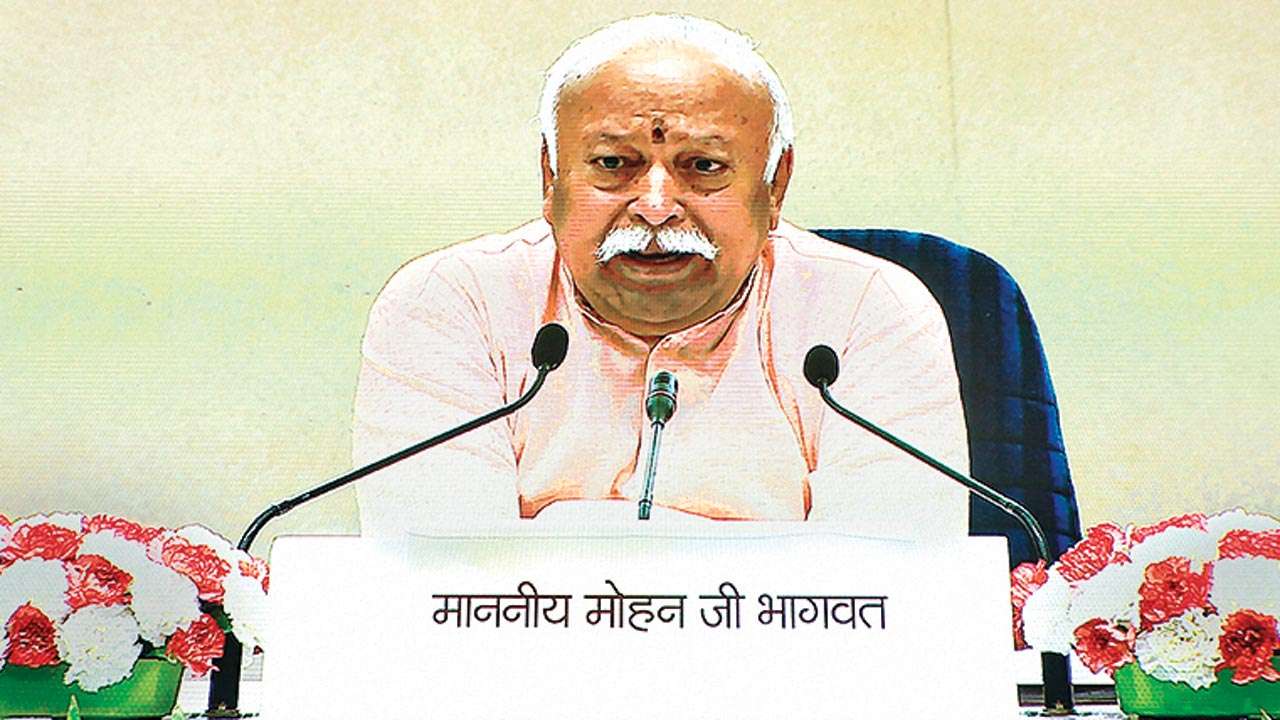
India’s Future: The RSS Viewpoint, the three-day lecture series in Delhi by RSS head Mohan Bhagwat, concluded on September 19. During its run-up, it was widely reported that Congress president Rahul Gandhi had himself been invited. Of course, Rahul didn’t make it, unlike another illustrious invitee, former President of India and Congress leader Pranab Mukherjee, to a previous RSS event. Had Rahul, or for that matter any notable Opposition leader come, even asked a few uncomfortable questions, it is the RSS that would have emerged as open to criticism.
As it happened, they abstained, showing they were uninterested in dialogue or engagement. Either way, it was a win-win for RSS.
But the three-day lecture series was much more than an outreach and public relations triumph for India’s arguably largest, if most misunderstood, organisation. It was also an occasion for deep soul-searching as well as unprecedented pronouncements by the RSS Sarsanghchalak. The programme was superbly organised, beginning on the dot and conducted with clockwork precision, and followed by high tea and bonhomie in the best traditions of Indian hospitality. Its sheer logistical success would have been the envy of other cadre-based organisations.
The event was coordinated by the Delhi chapter of the RSS. Its Pranth Karyavah, Bharat Bhushan, opened with an eloquent introduction in chaste Hindi. This was followed by a peroration by member of the Central Executive Council Bajarangalal Gupta, whose strong voice and oratorical prowess belied his frail and aged frame. Indeed, one distinguishing feature of senior RSS functionaries is their talent in public speaking, not only in Hindi but also in English and other regional languages.
The first day’s lecture by Bhagwat began with the admission that the RSS is misunderstood because both its work and mission are unparalleled. Since there is nothing quite like it, there is nothing to compare it with. No wonder it is often misunderstood. But Bhagwat was being kind here; he didn’t mention the deliberate and vicious demonisation of the organisation. The obvious and devious political intent of which was to prevent a Hindu consolidation that would upset the minoritarian applecart. Instead, Bhagwat not only praised the Congress but also acknowledged a host of other national leaders, including communists and socialists. But then the RSS can afford to be generous. The BJP, its political brain- and brawn-child, rules at the Centre and so many states. The RSS has won, while its detractors have lost.
Bhagwat spoke movingly of the organisation’s selfless and visionary founder, Dr Baliram Keshav Hedgewar, who wished to unite and build Hindu society rather than capture power. Indeed, the most important takeaway was how we, as citizens of this great country, need to assume responsibility rather than looking to the government for all our needs. A nation is only a great as its people, Bhagwat emphasised. Therefore, the chief goal of the RSS was to build character, produce unselfish and public-spirited individuals, renew native and innate samskars, deep-seated positive tendencies of the Hindu society. “The Sangh does not seek domination; the people should make the nation, not the RSS,” Bhagwat said.
It was samuhik shakti, the collective power of the people, that had to be awakened and encouraged: “We say that we are ready to die for country, but how about living for it, trying to make it great again?”
As widely reported in the media, Bhagwat made several extraordinary statements during this lecture series. On inclusive Hindutva he said, “India is a country full of diversity and it must be respected and celebrated.” Even more radical was his following observation: “The day it is said that Muslims are unwanted here, the concept of Hindutva will cease to exist.”
He unequivocally denounced lynchings, calling for strict action against the guilty; instead, we should keep our cows and take care of them. On building a Ram Mandir at Ayodhya, he said that it will help remove a major cause of discord between Hindu and Muslims. On the Supreme Court verdict on Section 377, Bhagwat said that the RSS welcomed it: “LGBTQ community should not be isolated in the society”, but treated with “sensitivity”. The RSS also supported inter-caste marriages and reservations even though it was against “quota politics”.
One of his boldest announcements was that the RSS no longer endorsed portions of ‘Guruji’ MS Golwalkar’s Bunch of Old Thoughts. “The book was a compilation of speeches which were made in a particular context, which cannot be eternally valid,” he said.
In the end, it is the RSS that has emerged as willing to dialogue and debate, capable of changing with the times, open to introspection and evolution while its detractors appear rigid, intolerant, and prejudiced. A great accomplishment indeed for the whole organisation as also for its head, Mohan Rao Bhagwat.
The author is Director, Indian Institute of Advanced Study, Shimla. Views expressed are personal.